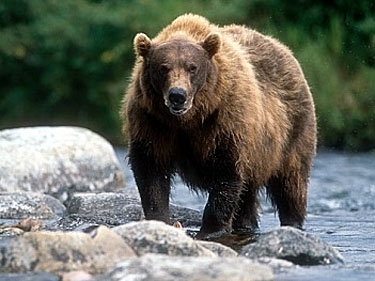Omnivore (Agricultural & Resource Economics)
An omnivore is an animal that consumes both animals and plants as part of it typcial diet. There is no strict definition of how much plant and animal material an animal must eat in order to be considered an omnivore. Carnivores that rarely eat plant material and herbivores that rarely eat animals would not be considered omnivores. Often omnivores have extremely general diets that include a wide range of of animal, plant, and fungal material. Insects, mites, copepods, crustaceans, echinoderms, fish, lizards, birds and mammals are among the species observed to have omnivorous diets. Many humans follow an omnivorous diet.
Omnivores tend to lack the morphological and physiological adapatations found in animals with more specialized diets because they must be able to capture, consume, and digest a wide variety of food types. Animalswith omnivorous diets are able to take advantage of a wide range of seasonally available food sources (e.g. fruits, insects) so their diet may change throughout the year as the availability of food types changes. Some species, known as life-history omnivores, consume different types of foods at different times of their life cycles.
Trophic and digestive phenotypes
Becauase omnivores eat such a generalized diet they lack the specialized phenotypes used by specialists to capture and digest food. Often the phenotypes of omnivores are intermediate between the phenotypes of specialized carnivores and herbivores. For example, the teeth ofmammalian omnivores have characteristics intermediate to the sharp, cutting teeth of mammalian carnivores and the flat, grinding teeth of mammalian herbivores. Omnivorous insects produce enzymes that allow them to digest both plant and animal matter.
Diet choice in omnivores
Diet mixing occurs when the ingestion of one type of food affects affects the nutritional quality of another type of food. For example, an animal may be able to extract more nutrients from an animal if it has already consumed a particular type of plant. Diet mixing occurs in many omnivores so the choice of animal food in the diet is determined by the choice of plant food.
Omnivores in the food web
Unlike carnivores and herbivores, omnivores can fill multiple trophic positions in the food web. Omnivores may function both as primary consumers, animals that feed on plants, or secondary or higher-order consumers, animals that feed on other animals. Thus, omnivorous species have the ability to directly influence the population sizes of other species by serving as prey or acting as predators. Becasue they are able to switch from one type of prey to another, omnivores are able to survive when specialized carnivores or herbivores would perish.
Both theoretical and empirical evidence suggests that omnivores may be more effective at regulating the population sizes of their prey because they are able to maintain their population size by switching to alternative foods when the population size of the prey becomes quite small. Thus, omnivores my be expecially valuable agents of biological control of pests.
Invasive species
Becasue they are able to feed on a variety of food types, omnivores may be more likely to invade, and have larger effects post-invasion, than animals with more specialized diets (see invasive species, alien species). Certain species of ants and crayfish may be examples of species that have large effects on native species following invasion.
Life-history omnivores
Life-history omnivores feed on different types of foods at different life stages. For example, herbivorous tadpoles metamorphose into carnivorous frogs. Life-history omnivory may be advantageous because it reduces competition between different life stages.
References and further reading
- Omnivorous Insects: Evolution and Ecology in Natural and Agricultural Ecosystems. B.A. Krimmel (2011)
- Food web structure affects the extinction risk of species in ecological communities. T. Honsson, P. Karlsson, & A. Jonsson (2006)
- What do grizzly bears eat? U.S. Fish and Wlidlife Service
- Caretta caretta Loggerhead turtle. Encyclopedia of Life
- Carnivore on Encyclopedia of Earth
- Red Imported Fire Ant Encyclopedia of Life
